Cost Saving Sustainability in Private Sector Procurement Report
VerifiedAdded on 2023/04/19
|11
|2246
|160
Report
AI Summary
This report is a comprehensive proposal that investigates the critical role of cost-saving sustainability within the private sector procurement landscape. It begins by outlining the research aims and objectives, which include identifying cost-saving techniques, assessing stakeholder views on transparent bidding, analyzing the effectiveness of negotiations, and pinpointing the challenges associated with achieving cost-saving sustainability. The research questions are formulated to guide recommendations for sustaining and improving cost-saving practices in the private sector. The literature review synthesizes existing research on procurement processes, cost management, and the importance of transparency and stakeholder engagement. The methodology section details a realism-based research philosophy, employing both secondary data from peer-reviewed journals and primary data collected through interviews with experienced professionals. The data collection procedure incorporates both secondary and primary data, utilizing non-probabilistic, probabilistic, and random sampling techniques. Data analysis will involve both qualitative and quantitative methods, with ethical considerations ensuring participant privacy and proper attribution. The report concludes with a timeline for the project, detailing key tasks and deadlines, and a comprehensive reference list.
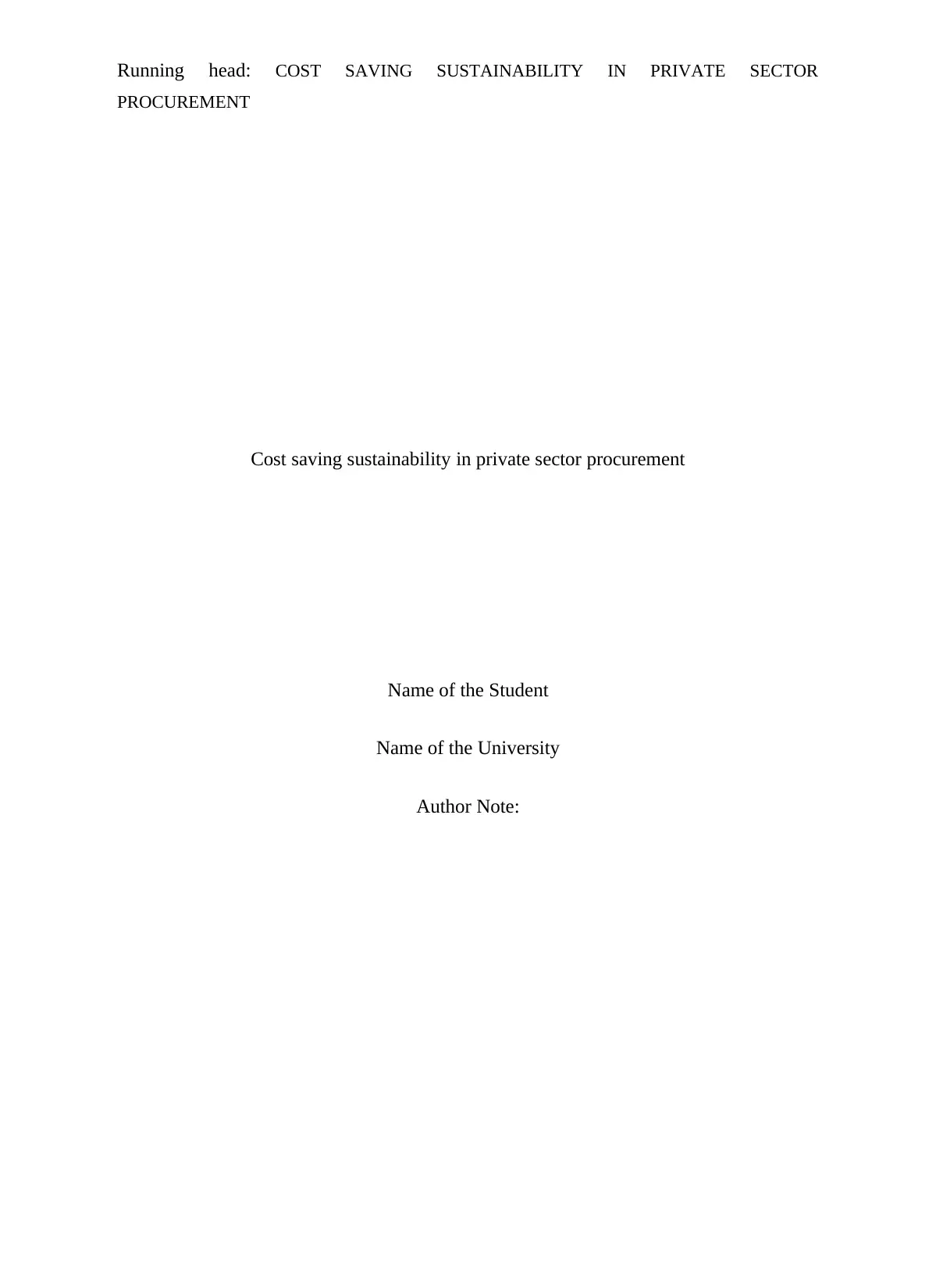
Running head: COST SAVING SUSTAINABILITY IN PRIVATE SECTOR
PROCUREMENT
Cost saving sustainability in private sector procurement
Name of the Student
Name of the University
Author Note:
PROCUREMENT
Cost saving sustainability in private sector procurement
Name of the Student
Name of the University
Author Note:
Paraphrase This Document
Need a fresh take? Get an instant paraphrase of this document with our AI Paraphraser
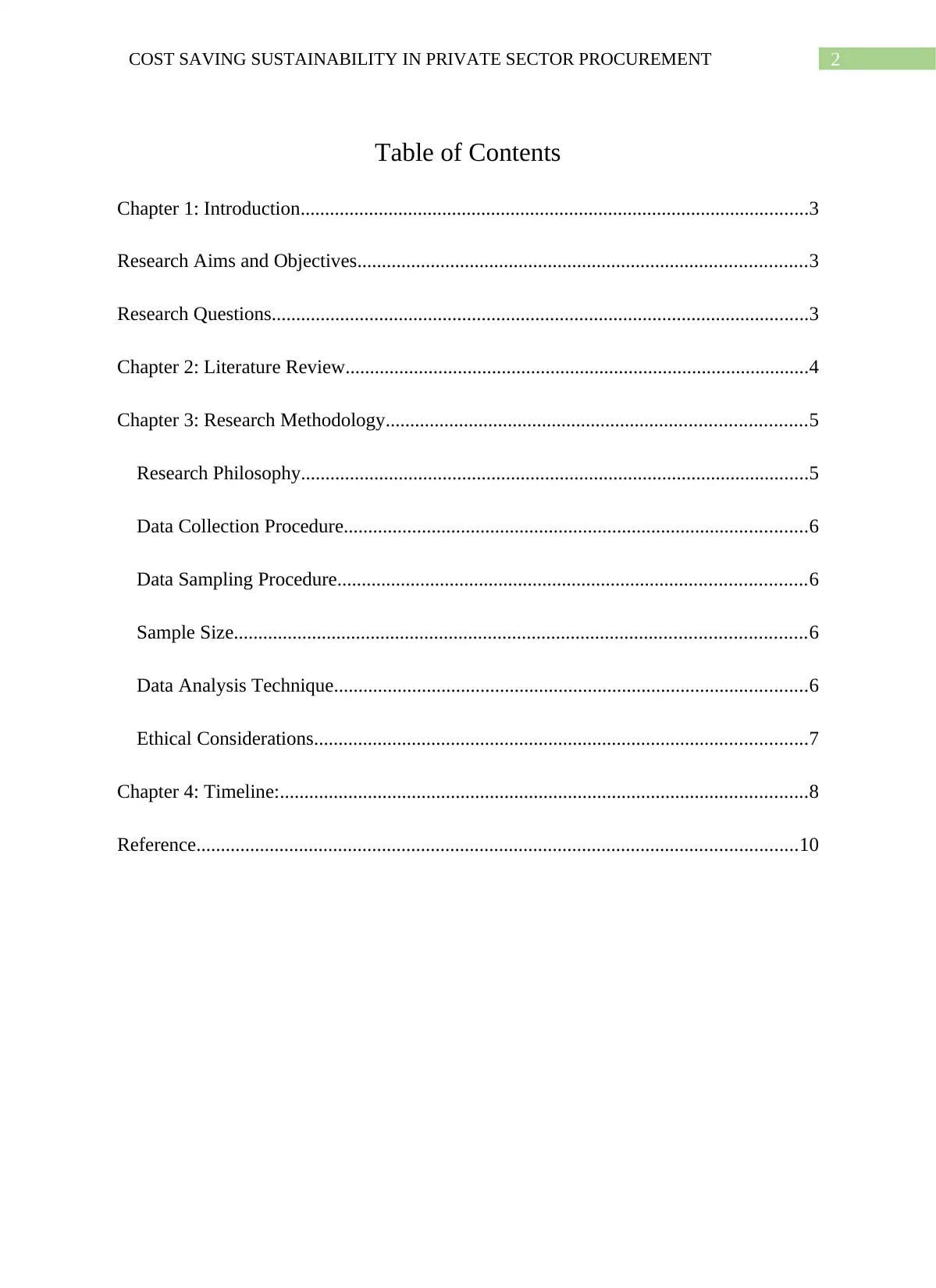
2COST SAVING SUSTAINABILITY IN PRIVATE SECTOR PROCUREMENT
Table of Contents
Chapter 1: Introduction........................................................................................................3
Research Aims and Objectives............................................................................................3
Research Questions..............................................................................................................3
Chapter 2: Literature Review...............................................................................................4
Chapter 3: Research Methodology......................................................................................5
Research Philosophy........................................................................................................5
Data Collection Procedure...............................................................................................6
Data Sampling Procedure................................................................................................6
Sample Size.....................................................................................................................6
Data Analysis Technique.................................................................................................6
Ethical Considerations.....................................................................................................7
Chapter 4: Timeline:............................................................................................................8
Reference...........................................................................................................................10
Table of Contents
Chapter 1: Introduction........................................................................................................3
Research Aims and Objectives............................................................................................3
Research Questions..............................................................................................................3
Chapter 2: Literature Review...............................................................................................4
Chapter 3: Research Methodology......................................................................................5
Research Philosophy........................................................................................................5
Data Collection Procedure...............................................................................................6
Data Sampling Procedure................................................................................................6
Sample Size.....................................................................................................................6
Data Analysis Technique.................................................................................................6
Ethical Considerations.....................................................................................................7
Chapter 4: Timeline:............................................................................................................8
Reference...........................................................................................................................10
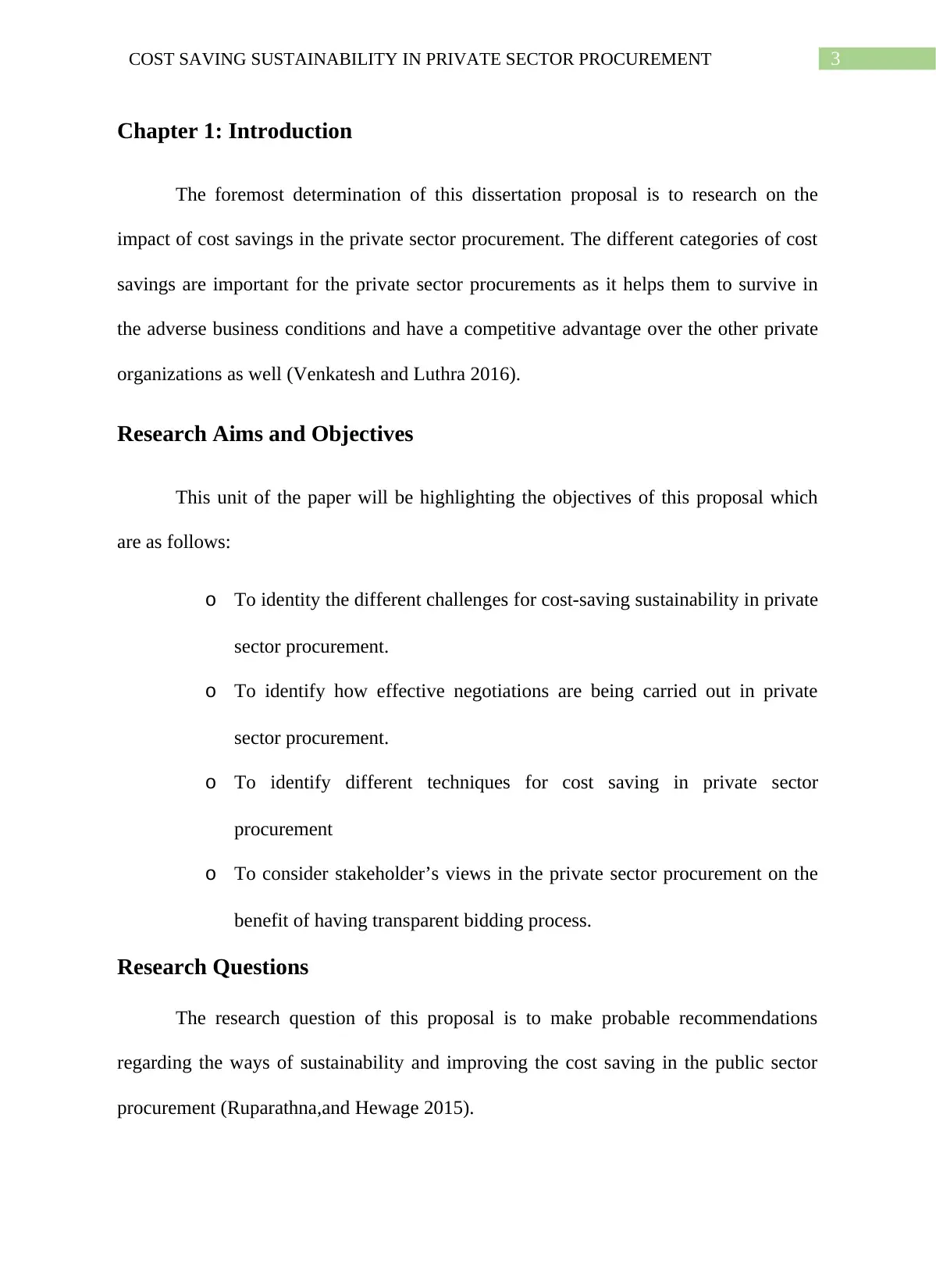
3COST SAVING SUSTAINABILITY IN PRIVATE SECTOR PROCUREMENT
Chapter 1: Introduction
The foremost determination of this dissertation proposal is to research on the
impact of cost savings in the private sector procurement. The different categories of cost
savings are important for the private sector procurements as it helps them to survive in
the adverse business conditions and have a competitive advantage over the other private
organizations as well (Venkatesh and Luthra 2016).
Research Aims and Objectives
This unit of the paper will be highlighting the objectives of this proposal which
are as follows:
o To identity the different challenges for cost-saving sustainability in private
sector procurement.
o To identify how effective negotiations are being carried out in private
sector procurement.
o To identify different techniques for cost saving in private sector
procurement
o To consider stakeholder’s views in the private sector procurement on the
benefit of having transparent bidding process.
Research Questions
The research question of this proposal is to make probable recommendations
regarding the ways of sustainability and improving the cost saving in the public sector
procurement (Ruparathna,and Hewage 2015).
Chapter 1: Introduction
The foremost determination of this dissertation proposal is to research on the
impact of cost savings in the private sector procurement. The different categories of cost
savings are important for the private sector procurements as it helps them to survive in
the adverse business conditions and have a competitive advantage over the other private
organizations as well (Venkatesh and Luthra 2016).
Research Aims and Objectives
This unit of the paper will be highlighting the objectives of this proposal which
are as follows:
o To identity the different challenges for cost-saving sustainability in private
sector procurement.
o To identify how effective negotiations are being carried out in private
sector procurement.
o To identify different techniques for cost saving in private sector
procurement
o To consider stakeholder’s views in the private sector procurement on the
benefit of having transparent bidding process.
Research Questions
The research question of this proposal is to make probable recommendations
regarding the ways of sustainability and improving the cost saving in the public sector
procurement (Ruparathna,and Hewage 2015).
⊘ This is a preview!⊘
Do you want full access?
Subscribe today to unlock all pages.

Trusted by 1+ million students worldwide
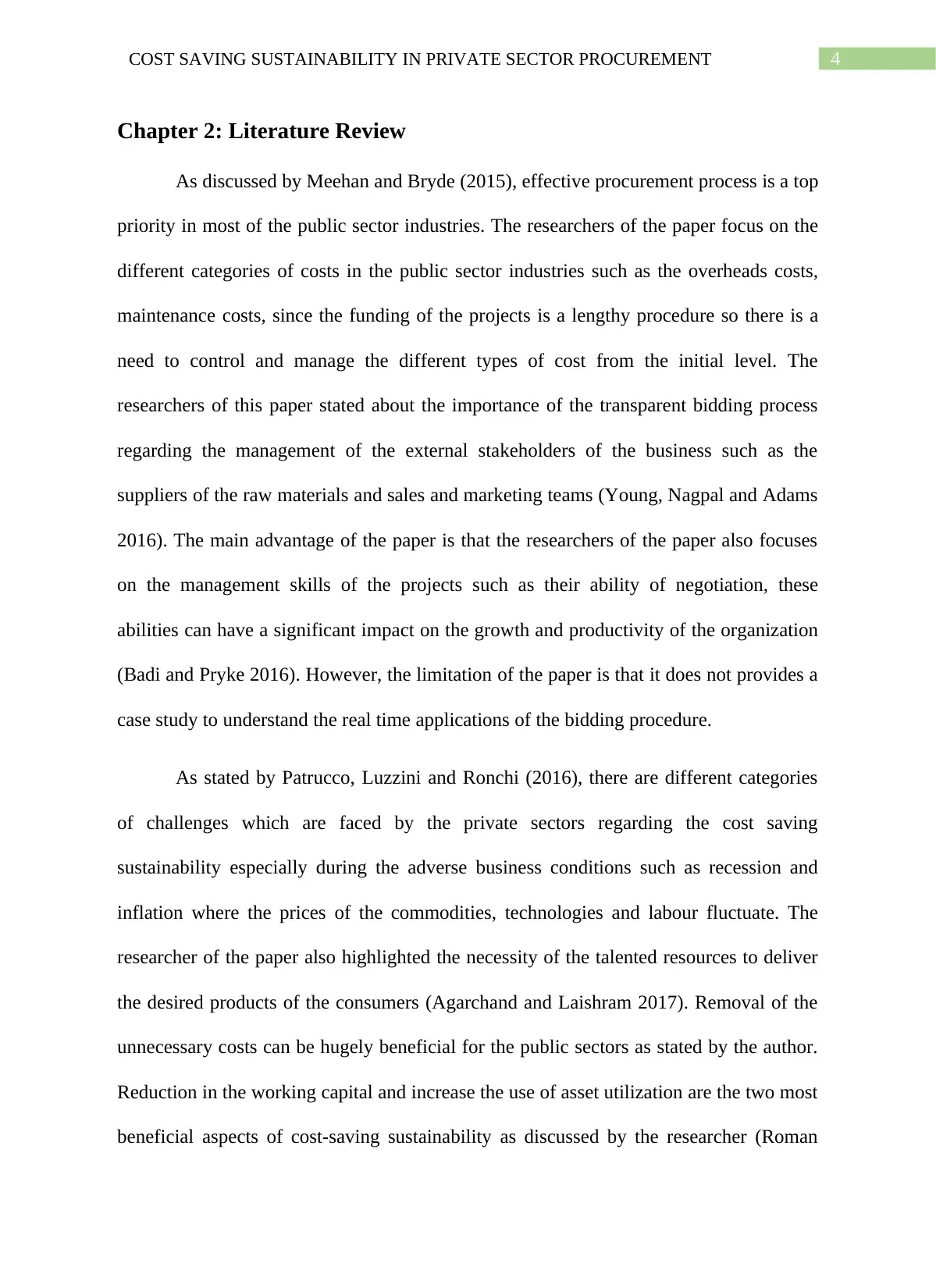
4COST SAVING SUSTAINABILITY IN PRIVATE SECTOR PROCUREMENT
Chapter 2: Literature Review
As discussed by Meehan and Bryde (2015), effective procurement process is a top
priority in most of the public sector industries. The researchers of the paper focus on the
different categories of costs in the public sector industries such as the overheads costs,
maintenance costs, since the funding of the projects is a lengthy procedure so there is a
need to control and manage the different types of cost from the initial level. The
researchers of this paper stated about the importance of the transparent bidding process
regarding the management of the external stakeholders of the business such as the
suppliers of the raw materials and sales and marketing teams (Young, Nagpal and Adams
2016). The main advantage of the paper is that the researchers of the paper also focuses
on the management skills of the projects such as their ability of negotiation, these
abilities can have a significant impact on the growth and productivity of the organization
(Badi and Pryke 2016). However, the limitation of the paper is that it does not provides a
case study to understand the real time applications of the bidding procedure.
As stated by Patrucco, Luzzini and Ronchi (2016), there are different categories
of challenges which are faced by the private sectors regarding the cost saving
sustainability especially during the adverse business conditions such as recession and
inflation where the prices of the commodities, technologies and labour fluctuate. The
researcher of the paper also highlighted the necessity of the talented resources to deliver
the desired products of the consumers (Agarchand and Laishram 2017). Removal of the
unnecessary costs can be hugely beneficial for the public sectors as stated by the author.
Reduction in the working capital and increase the use of asset utilization are the two most
beneficial aspects of cost-saving sustainability as discussed by the researcher (Roman
Chapter 2: Literature Review
As discussed by Meehan and Bryde (2015), effective procurement process is a top
priority in most of the public sector industries. The researchers of the paper focus on the
different categories of costs in the public sector industries such as the overheads costs,
maintenance costs, since the funding of the projects is a lengthy procedure so there is a
need to control and manage the different types of cost from the initial level. The
researchers of this paper stated about the importance of the transparent bidding process
regarding the management of the external stakeholders of the business such as the
suppliers of the raw materials and sales and marketing teams (Young, Nagpal and Adams
2016). The main advantage of the paper is that the researchers of the paper also focuses
on the management skills of the projects such as their ability of negotiation, these
abilities can have a significant impact on the growth and productivity of the organization
(Badi and Pryke 2016). However, the limitation of the paper is that it does not provides a
case study to understand the real time applications of the bidding procedure.
As stated by Patrucco, Luzzini and Ronchi (2016), there are different categories
of challenges which are faced by the private sectors regarding the cost saving
sustainability especially during the adverse business conditions such as recession and
inflation where the prices of the commodities, technologies and labour fluctuate. The
researcher of the paper also highlighted the necessity of the talented resources to deliver
the desired products of the consumers (Agarchand and Laishram 2017). Removal of the
unnecessary costs can be hugely beneficial for the public sectors as stated by the author.
Reduction in the working capital and increase the use of asset utilization are the two most
beneficial aspects of cost-saving sustainability as discussed by the researcher (Roman
Paraphrase This Document
Need a fresh take? Get an instant paraphrase of this document with our AI Paraphraser
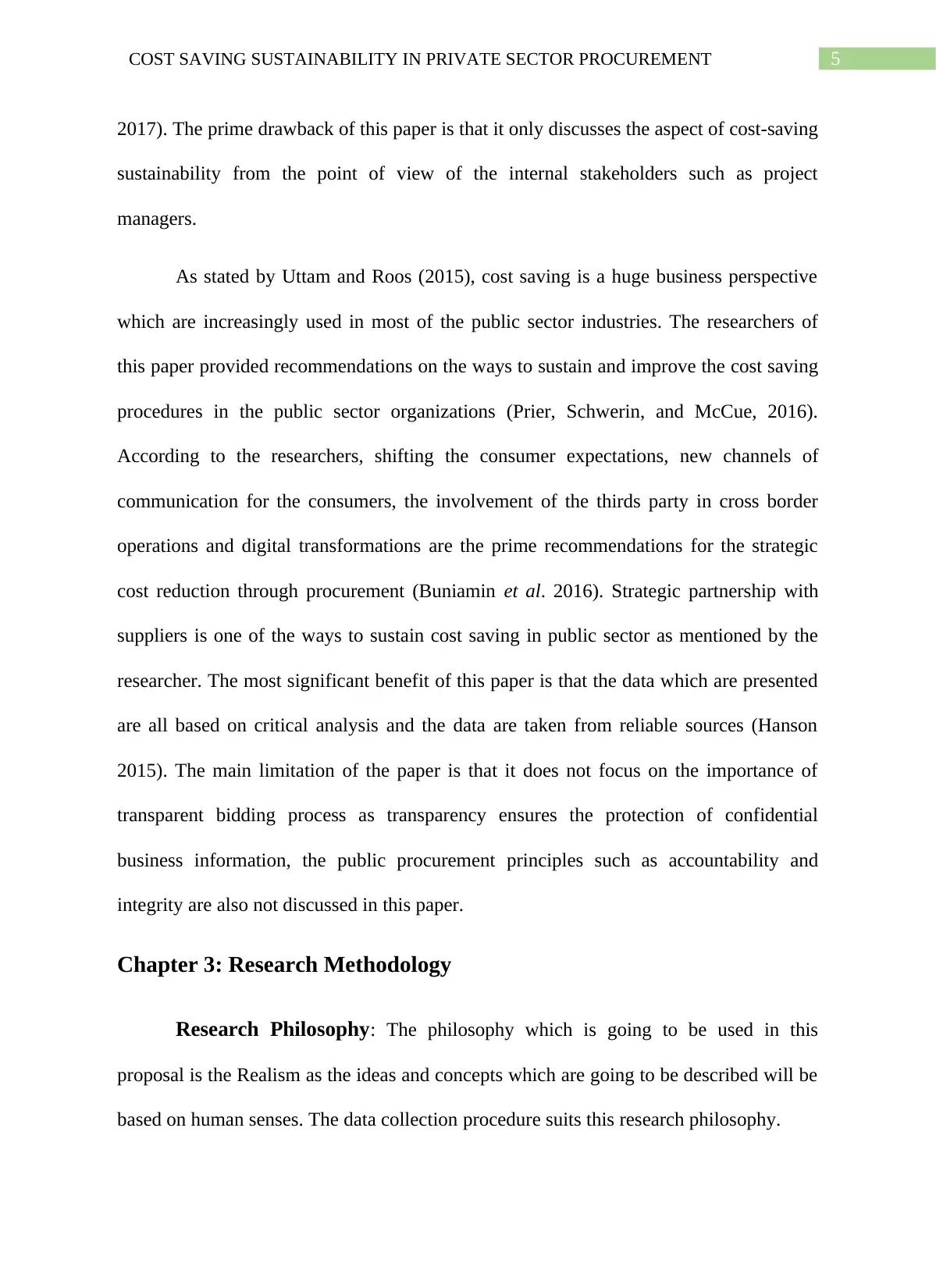
5COST SAVING SUSTAINABILITY IN PRIVATE SECTOR PROCUREMENT
2017). The prime drawback of this paper is that it only discusses the aspect of cost-saving
sustainability from the point of view of the internal stakeholders such as project
managers.
As stated by Uttam and Roos (2015), cost saving is a huge business perspective
which are increasingly used in most of the public sector industries. The researchers of
this paper provided recommendations on the ways to sustain and improve the cost saving
procedures in the public sector organizations (Prier, Schwerin, and McCue, 2016).
According to the researchers, shifting the consumer expectations, new channels of
communication for the consumers, the involvement of the thirds party in cross border
operations and digital transformations are the prime recommendations for the strategic
cost reduction through procurement (Buniamin et al. 2016). Strategic partnership with
suppliers is one of the ways to sustain cost saving in public sector as mentioned by the
researcher. The most significant benefit of this paper is that the data which are presented
are all based on critical analysis and the data are taken from reliable sources (Hanson
2015). The main limitation of the paper is that it does not focus on the importance of
transparent bidding process as transparency ensures the protection of confidential
business information, the public procurement principles such as accountability and
integrity are also not discussed in this paper.
Chapter 3: Research Methodology
Research Philosophy: The philosophy which is going to be used in this
proposal is the Realism as the ideas and concepts which are going to be described will be
based on human senses. The data collection procedure suits this research philosophy.
2017). The prime drawback of this paper is that it only discusses the aspect of cost-saving
sustainability from the point of view of the internal stakeholders such as project
managers.
As stated by Uttam and Roos (2015), cost saving is a huge business perspective
which are increasingly used in most of the public sector industries. The researchers of
this paper provided recommendations on the ways to sustain and improve the cost saving
procedures in the public sector organizations (Prier, Schwerin, and McCue, 2016).
According to the researchers, shifting the consumer expectations, new channels of
communication for the consumers, the involvement of the thirds party in cross border
operations and digital transformations are the prime recommendations for the strategic
cost reduction through procurement (Buniamin et al. 2016). Strategic partnership with
suppliers is one of the ways to sustain cost saving in public sector as mentioned by the
researcher. The most significant benefit of this paper is that the data which are presented
are all based on critical analysis and the data are taken from reliable sources (Hanson
2015). The main limitation of the paper is that it does not focus on the importance of
transparent bidding process as transparency ensures the protection of confidential
business information, the public procurement principles such as accountability and
integrity are also not discussed in this paper.
Chapter 3: Research Methodology
Research Philosophy: The philosophy which is going to be used in this
proposal is the Realism as the ideas and concepts which are going to be described will be
based on human senses. The data collection procedure suits this research philosophy.
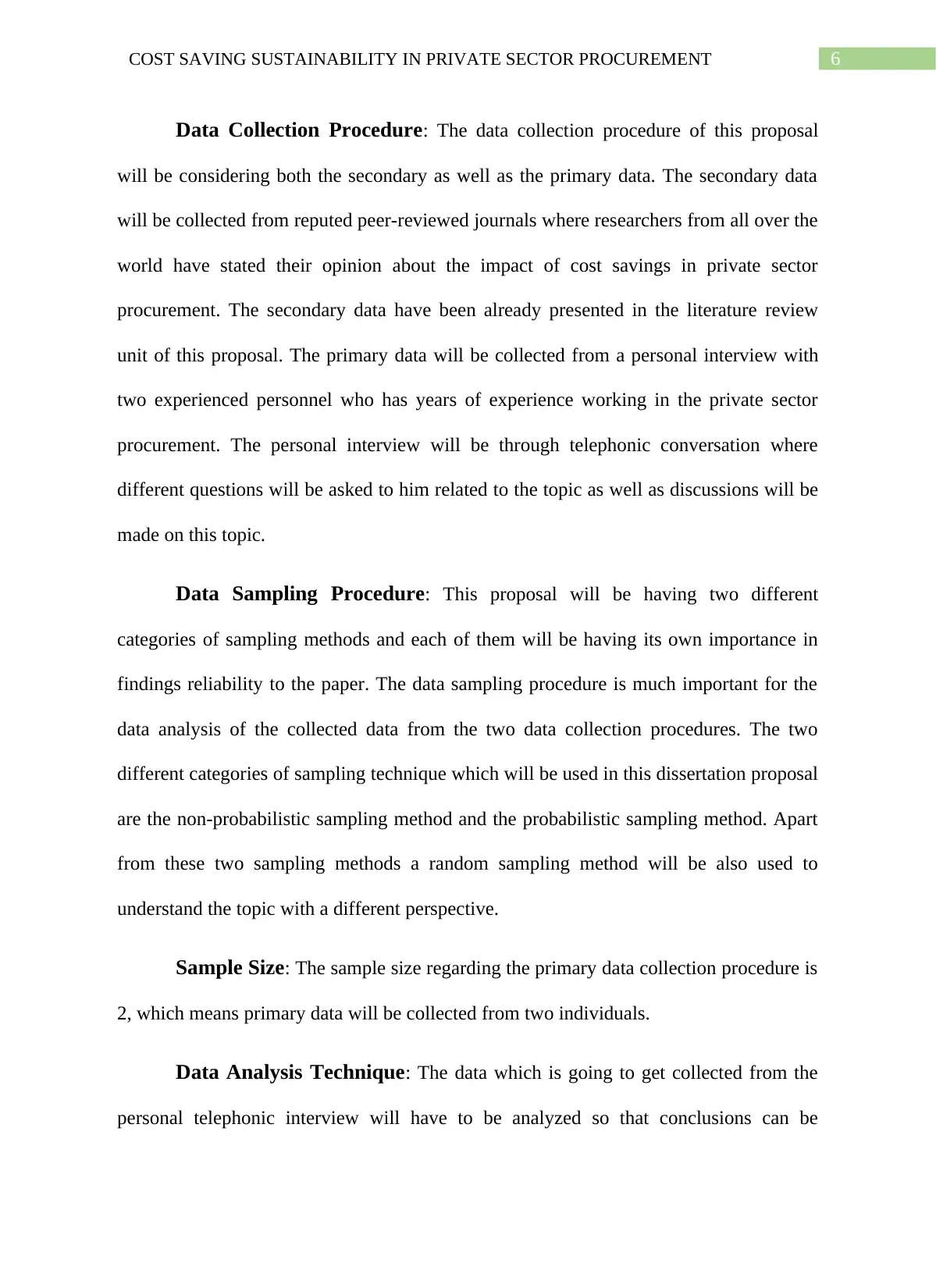
6COST SAVING SUSTAINABILITY IN PRIVATE SECTOR PROCUREMENT
Data Collection Procedure: The data collection procedure of this proposal
will be considering both the secondary as well as the primary data. The secondary data
will be collected from reputed peer-reviewed journals where researchers from all over the
world have stated their opinion about the impact of cost savings in private sector
procurement. The secondary data have been already presented in the literature review
unit of this proposal. The primary data will be collected from a personal interview with
two experienced personnel who has years of experience working in the private sector
procurement. The personal interview will be through telephonic conversation where
different questions will be asked to him related to the topic as well as discussions will be
made on this topic.
Data Sampling Procedure: This proposal will be having two different
categories of sampling methods and each of them will be having its own importance in
findings reliability to the paper. The data sampling procedure is much important for the
data analysis of the collected data from the two data collection procedures. The two
different categories of sampling technique which will be used in this dissertation proposal
are the non-probabilistic sampling method and the probabilistic sampling method. Apart
from these two sampling methods a random sampling method will be also used to
understand the topic with a different perspective.
Sample Size: The sample size regarding the primary data collection procedure is
2, which means primary data will be collected from two individuals.
Data Analysis Technique: The data which is going to get collected from the
personal telephonic interview will have to be analyzed so that conclusions can be
Data Collection Procedure: The data collection procedure of this proposal
will be considering both the secondary as well as the primary data. The secondary data
will be collected from reputed peer-reviewed journals where researchers from all over the
world have stated their opinion about the impact of cost savings in private sector
procurement. The secondary data have been already presented in the literature review
unit of this proposal. The primary data will be collected from a personal interview with
two experienced personnel who has years of experience working in the private sector
procurement. The personal interview will be through telephonic conversation where
different questions will be asked to him related to the topic as well as discussions will be
made on this topic.
Data Sampling Procedure: This proposal will be having two different
categories of sampling methods and each of them will be having its own importance in
findings reliability to the paper. The data sampling procedure is much important for the
data analysis of the collected data from the two data collection procedures. The two
different categories of sampling technique which will be used in this dissertation proposal
are the non-probabilistic sampling method and the probabilistic sampling method. Apart
from these two sampling methods a random sampling method will be also used to
understand the topic with a different perspective.
Sample Size: The sample size regarding the primary data collection procedure is
2, which means primary data will be collected from two individuals.
Data Analysis Technique: The data which is going to get collected from the
personal telephonic interview will have to be analyzed so that conclusions can be
⊘ This is a preview!⊘
Do you want full access?
Subscribe today to unlock all pages.

Trusted by 1+ million students worldwide
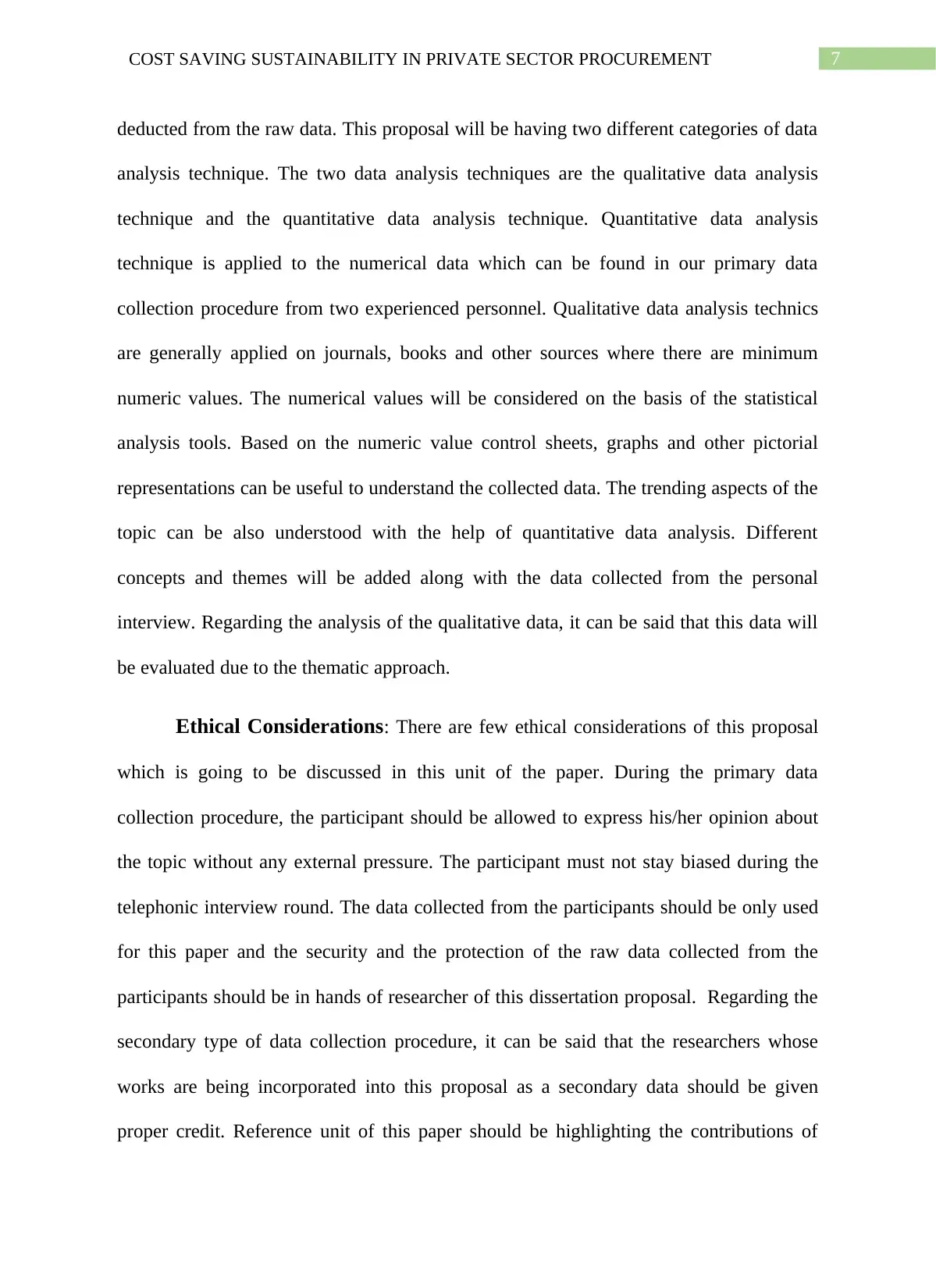
7COST SAVING SUSTAINABILITY IN PRIVATE SECTOR PROCUREMENT
deducted from the raw data. This proposal will be having two different categories of data
analysis technique. The two data analysis techniques are the qualitative data analysis
technique and the quantitative data analysis technique. Quantitative data analysis
technique is applied to the numerical data which can be found in our primary data
collection procedure from two experienced personnel. Qualitative data analysis technics
are generally applied on journals, books and other sources where there are minimum
numeric values. The numerical values will be considered on the basis of the statistical
analysis tools. Based on the numeric value control sheets, graphs and other pictorial
representations can be useful to understand the collected data. The trending aspects of the
topic can be also understood with the help of quantitative data analysis. Different
concepts and themes will be added along with the data collected from the personal
interview. Regarding the analysis of the qualitative data, it can be said that this data will
be evaluated due to the thematic approach.
Ethical Considerations: There are few ethical considerations of this proposal
which is going to be discussed in this unit of the paper. During the primary data
collection procedure, the participant should be allowed to express his/her opinion about
the topic without any external pressure. The participant must not stay biased during the
telephonic interview round. The data collected from the participants should be only used
for this paper and the security and the protection of the raw data collected from the
participants should be in hands of researcher of this dissertation proposal. Regarding the
secondary type of data collection procedure, it can be said that the researchers whose
works are being incorporated into this proposal as a secondary data should be given
proper credit. Reference unit of this paper should be highlighting the contributions of
deducted from the raw data. This proposal will be having two different categories of data
analysis technique. The two data analysis techniques are the qualitative data analysis
technique and the quantitative data analysis technique. Quantitative data analysis
technique is applied to the numerical data which can be found in our primary data
collection procedure from two experienced personnel. Qualitative data analysis technics
are generally applied on journals, books and other sources where there are minimum
numeric values. The numerical values will be considered on the basis of the statistical
analysis tools. Based on the numeric value control sheets, graphs and other pictorial
representations can be useful to understand the collected data. The trending aspects of the
topic can be also understood with the help of quantitative data analysis. Different
concepts and themes will be added along with the data collected from the personal
interview. Regarding the analysis of the qualitative data, it can be said that this data will
be evaluated due to the thematic approach.
Ethical Considerations: There are few ethical considerations of this proposal
which is going to be discussed in this unit of the paper. During the primary data
collection procedure, the participant should be allowed to express his/her opinion about
the topic without any external pressure. The participant must not stay biased during the
telephonic interview round. The data collected from the participants should be only used
for this paper and the security and the protection of the raw data collected from the
participants should be in hands of researcher of this dissertation proposal. Regarding the
secondary type of data collection procedure, it can be said that the researchers whose
works are being incorporated into this proposal as a secondary data should be given
proper credit. Reference unit of this paper should be highlighting the contributions of
Paraphrase This Document
Need a fresh take? Get an instant paraphrase of this document with our AI Paraphraser
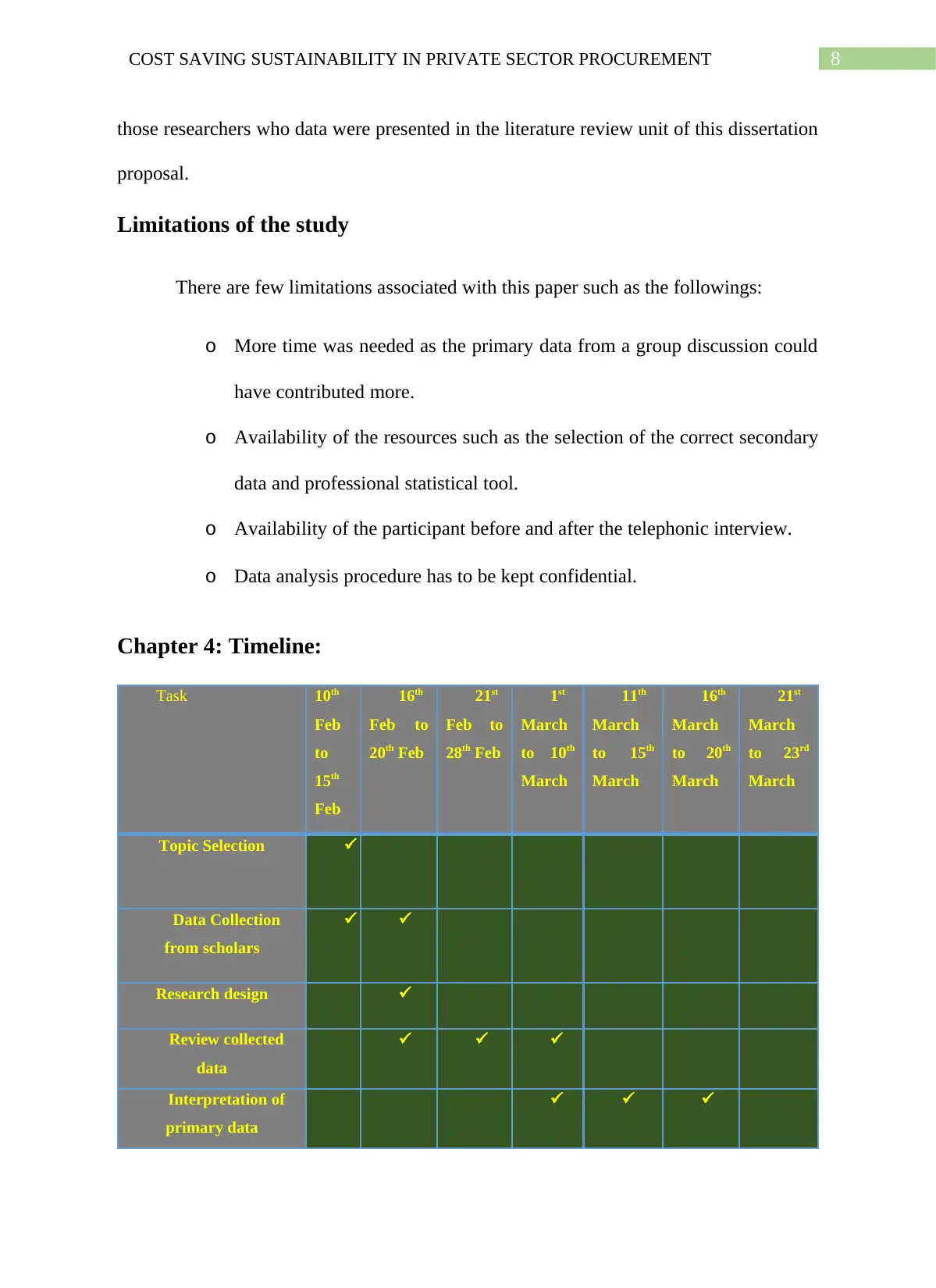
8COST SAVING SUSTAINABILITY IN PRIVATE SECTOR PROCUREMENT
those researchers who data were presented in the literature review unit of this dissertation
proposal.
Limitations of the study
There are few limitations associated with this paper such as the followings:
o More time was needed as the primary data from a group discussion could
have contributed more.
o Availability of the resources such as the selection of the correct secondary
data and professional statistical tool.
o Availability of the participant before and after the telephonic interview.
o Data analysis procedure has to be kept confidential.
Chapter 4: Timeline:
Task 10th
Feb
to
15th
Feb
16th
Feb to
20th Feb
21st
Feb to
28th Feb
1st
March
to 10th
March
11th
March
to 15th
March
16th
March
to 20th
March
21st
March
to 23rd
March
Topic Selection
Data Collection
from scholars
Research design
Review collected
data
Interpretation of
primary data
those researchers who data were presented in the literature review unit of this dissertation
proposal.
Limitations of the study
There are few limitations associated with this paper such as the followings:
o More time was needed as the primary data from a group discussion could
have contributed more.
o Availability of the resources such as the selection of the correct secondary
data and professional statistical tool.
o Availability of the participant before and after the telephonic interview.
o Data analysis procedure has to be kept confidential.
Chapter 4: Timeline:
Task 10th
Feb
to
15th
Feb
16th
Feb to
20th Feb
21st
Feb to
28th Feb
1st
March
to 10th
March
11th
March
to 15th
March
16th
March
to 20th
March
21st
March
to 23rd
March
Topic Selection
Data Collection
from scholars
Research design
Review collected
data
Interpretation of
primary data
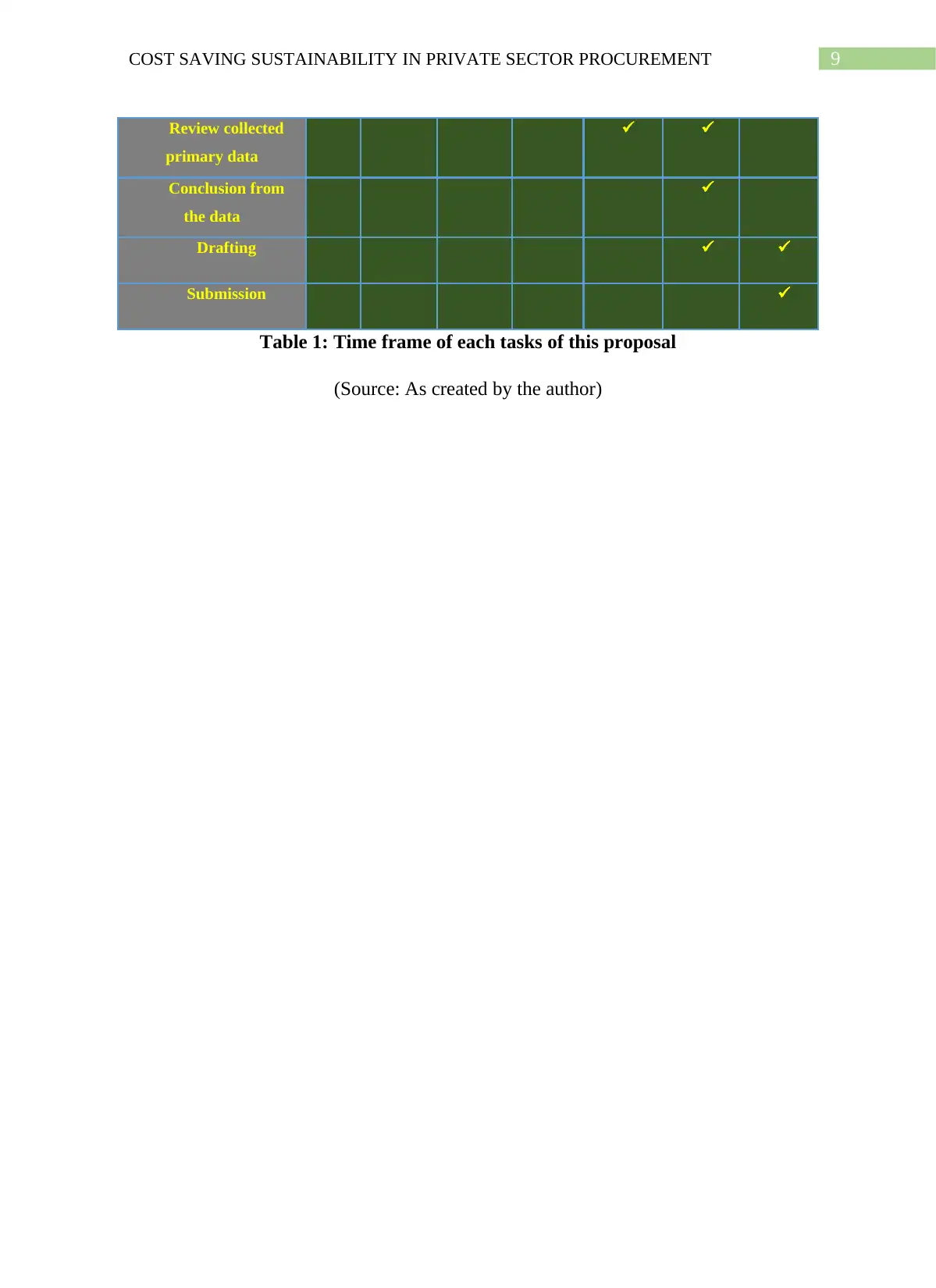
9COST SAVING SUSTAINABILITY IN PRIVATE SECTOR PROCUREMENT
Review collected
primary data
Conclusion from
the data
Drafting
Submission
Table 1: Time frame of each tasks of this proposal
(Source: As created by the author)
Review collected
primary data
Conclusion from
the data
Drafting
Submission
Table 1: Time frame of each tasks of this proposal
(Source: As created by the author)
⊘ This is a preview!⊘
Do you want full access?
Subscribe today to unlock all pages.

Trusted by 1+ million students worldwide
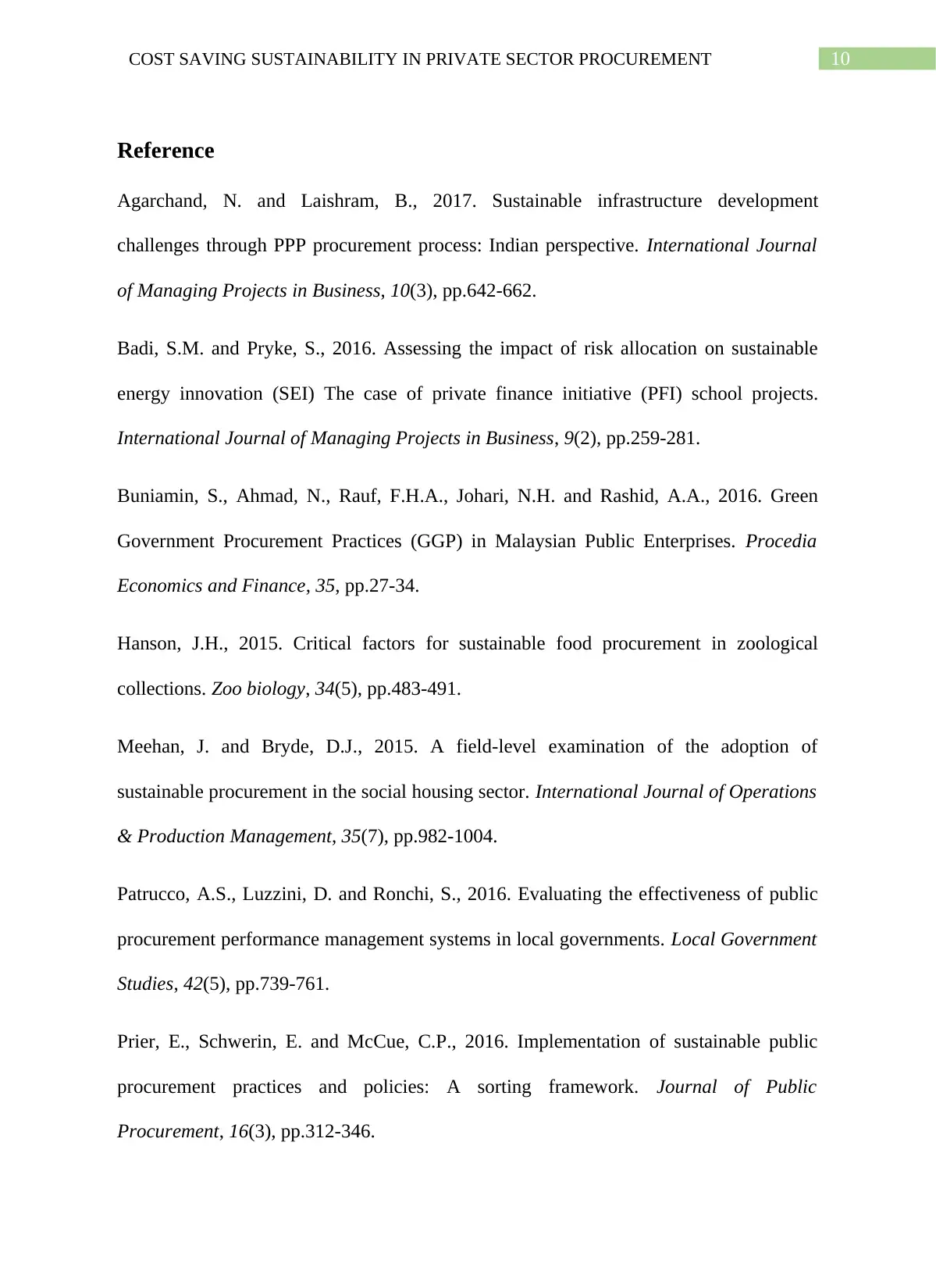
10COST SAVING SUSTAINABILITY IN PRIVATE SECTOR PROCUREMENT
Reference
Agarchand, N. and Laishram, B., 2017. Sustainable infrastructure development
challenges through PPP procurement process: Indian perspective. International Journal
of Managing Projects in Business, 10(3), pp.642-662.
Badi, S.M. and Pryke, S., 2016. Assessing the impact of risk allocation on sustainable
energy innovation (SEI) The case of private finance initiative (PFI) school projects.
International Journal of Managing Projects in Business, 9(2), pp.259-281.
Buniamin, S., Ahmad, N., Rauf, F.H.A., Johari, N.H. and Rashid, A.A., 2016. Green
Government Procurement Practices (GGP) in Malaysian Public Enterprises. Procedia
Economics and Finance, 35, pp.27-34.
Hanson, J.H., 2015. Critical factors for sustainable food procurement in zoological
collections. Zoo biology, 34(5), pp.483-491.
Meehan, J. and Bryde, D.J., 2015. A field-level examination of the adoption of
sustainable procurement in the social housing sector. International Journal of Operations
& Production Management, 35(7), pp.982-1004.
Patrucco, A.S., Luzzini, D. and Ronchi, S., 2016. Evaluating the effectiveness of public
procurement performance management systems in local governments. Local Government
Studies, 42(5), pp.739-761.
Prier, E., Schwerin, E. and McCue, C.P., 2016. Implementation of sustainable public
procurement practices and policies: A sorting framework. Journal of Public
Procurement, 16(3), pp.312-346.
Reference
Agarchand, N. and Laishram, B., 2017. Sustainable infrastructure development
challenges through PPP procurement process: Indian perspective. International Journal
of Managing Projects in Business, 10(3), pp.642-662.
Badi, S.M. and Pryke, S., 2016. Assessing the impact of risk allocation on sustainable
energy innovation (SEI) The case of private finance initiative (PFI) school projects.
International Journal of Managing Projects in Business, 9(2), pp.259-281.
Buniamin, S., Ahmad, N., Rauf, F.H.A., Johari, N.H. and Rashid, A.A., 2016. Green
Government Procurement Practices (GGP) in Malaysian Public Enterprises. Procedia
Economics and Finance, 35, pp.27-34.
Hanson, J.H., 2015. Critical factors for sustainable food procurement in zoological
collections. Zoo biology, 34(5), pp.483-491.
Meehan, J. and Bryde, D.J., 2015. A field-level examination of the adoption of
sustainable procurement in the social housing sector. International Journal of Operations
& Production Management, 35(7), pp.982-1004.
Patrucco, A.S., Luzzini, D. and Ronchi, S., 2016. Evaluating the effectiveness of public
procurement performance management systems in local governments. Local Government
Studies, 42(5), pp.739-761.
Prier, E., Schwerin, E. and McCue, C.P., 2016. Implementation of sustainable public
procurement practices and policies: A sorting framework. Journal of Public
Procurement, 16(3), pp.312-346.
Paraphrase This Document
Need a fresh take? Get an instant paraphrase of this document with our AI Paraphraser
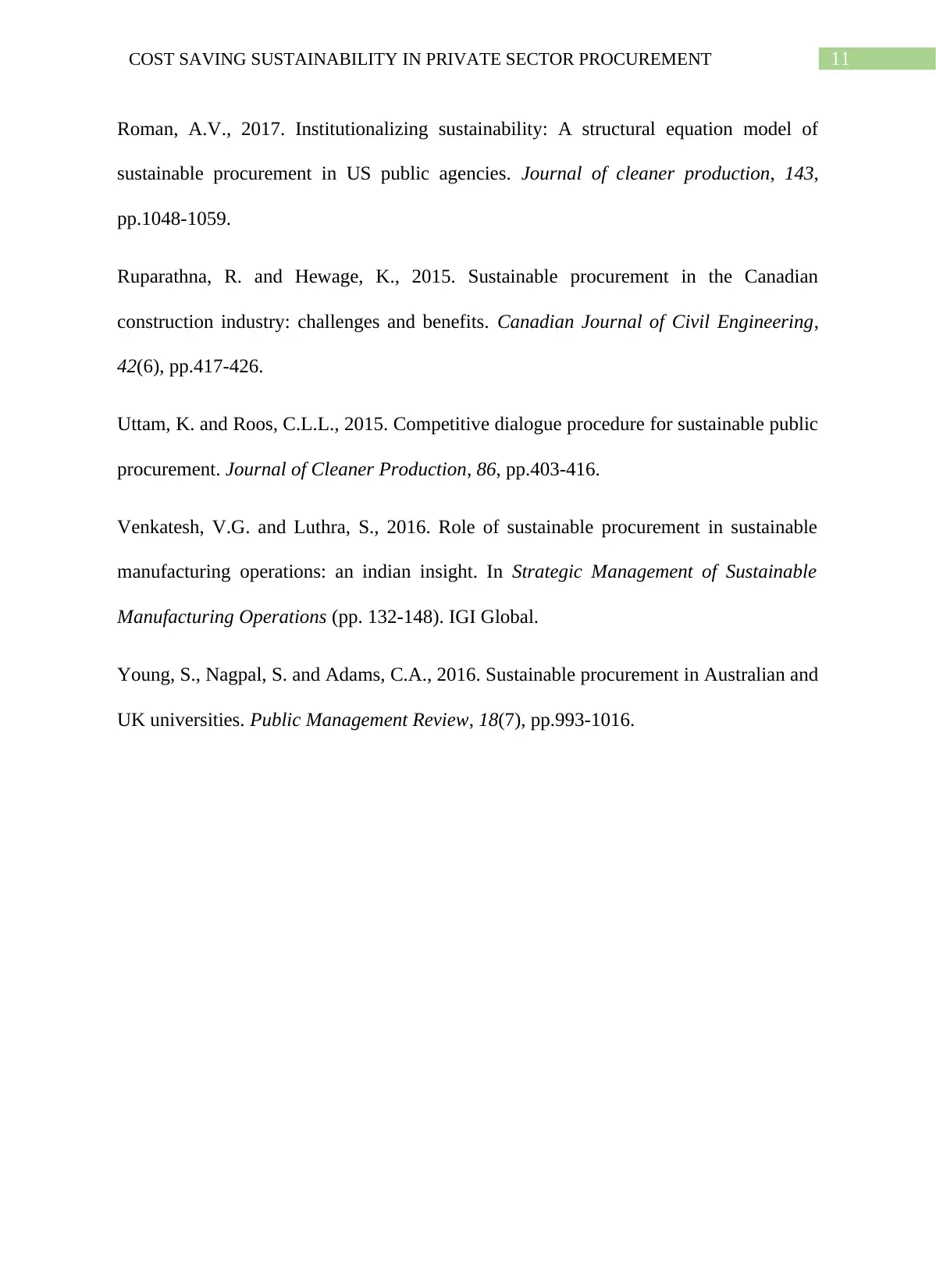
11COST SAVING SUSTAINABILITY IN PRIVATE SECTOR PROCUREMENT
Roman, A.V., 2017. Institutionalizing sustainability: A structural equation model of
sustainable procurement in US public agencies. Journal of cleaner production, 143,
pp.1048-1059.
Ruparathna, R. and Hewage, K., 2015. Sustainable procurement in the Canadian
construction industry: challenges and benefits. Canadian Journal of Civil Engineering,
42(6), pp.417-426.
Uttam, K. and Roos, C.L.L., 2015. Competitive dialogue procedure for sustainable public
procurement. Journal of Cleaner Production, 86, pp.403-416.
Venkatesh, V.G. and Luthra, S., 2016. Role of sustainable procurement in sustainable
manufacturing operations: an indian insight. In Strategic Management of Sustainable
Manufacturing Operations (pp. 132-148). IGI Global.
Young, S., Nagpal, S. and Adams, C.A., 2016. Sustainable procurement in Australian and
UK universities. Public Management Review, 18(7), pp.993-1016.
Roman, A.V., 2017. Institutionalizing sustainability: A structural equation model of
sustainable procurement in US public agencies. Journal of cleaner production, 143,
pp.1048-1059.
Ruparathna, R. and Hewage, K., 2015. Sustainable procurement in the Canadian
construction industry: challenges and benefits. Canadian Journal of Civil Engineering,
42(6), pp.417-426.
Uttam, K. and Roos, C.L.L., 2015. Competitive dialogue procedure for sustainable public
procurement. Journal of Cleaner Production, 86, pp.403-416.
Venkatesh, V.G. and Luthra, S., 2016. Role of sustainable procurement in sustainable
manufacturing operations: an indian insight. In Strategic Management of Sustainable
Manufacturing Operations (pp. 132-148). IGI Global.
Young, S., Nagpal, S. and Adams, C.A., 2016. Sustainable procurement in Australian and
UK universities. Public Management Review, 18(7), pp.993-1016.
1 out of 11
Related Documents
Your All-in-One AI-Powered Toolkit for Academic Success.
+13062052269
info@desklib.com
Available 24*7 on WhatsApp / Email
![[object Object]](/_next/static/media/star-bottom.7253800d.svg)
Unlock your academic potential
Copyright © 2020–2026 A2Z Services. All Rights Reserved. Developed and managed by ZUCOL.





